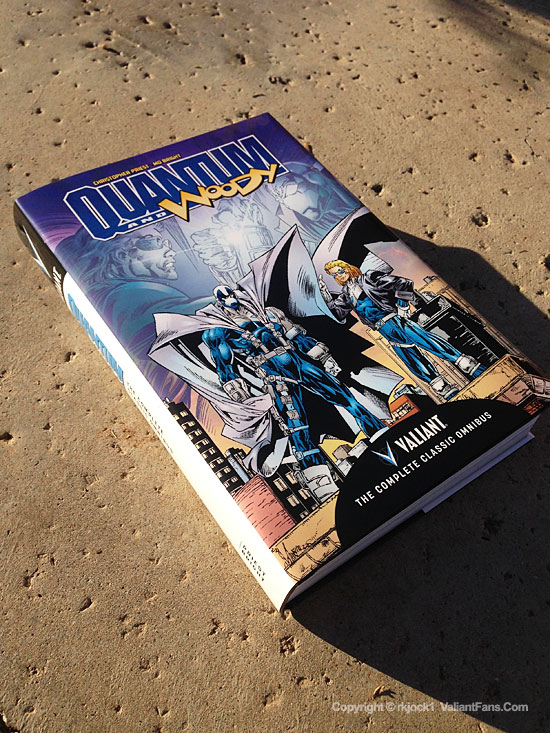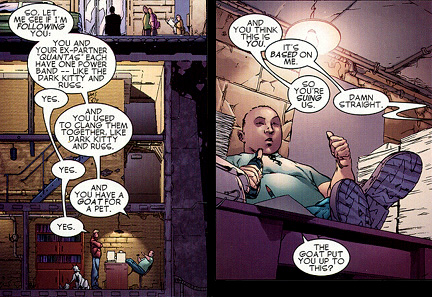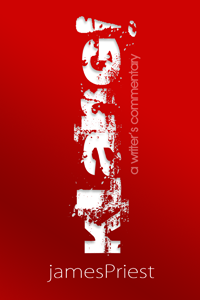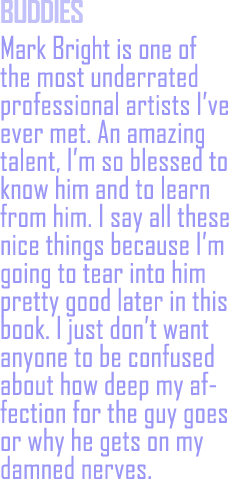
I wouldn’t call this a tell-all.
It is, at most, a tell-some. Beginning with Fabian Nicieza’s call
to develop “something like Power Man and Iron Fist” for his new
venture, a comics line for the video game company Acclaim, KLANG!
A Writer’s Commentary is mostly my usual whining and gassing on
about the good and the bad of the comic book creative process.
The mini-memoir includes the six unpublished “lost” scripts to
Quantum & Woody #22-27 (the last issue published was issue #21)
as well as the unpublished versions of early drafts from Q2: The
Return of Quantum & Woody, along with about 40 or so pages of me
bitching and complaining and biting the hand that fed me. Or, at
least, gnawing on it a little.
This started out as just another website rant. I’ve been meaning
to update my post,
here, about the Q2 project for quite some
time, but I honestly did not know what to say. I certainly
didn’t (and still don't) want to negatively impact sales. The creative development on
the project was pretty tough for me—and, possibly, exclusively
me. At the end of the day, the project seemed to be
well-received, and, so far as I am aware, I’m the only guy whose
glass remains half-full.
In short strokes: there were creative differences that made for rough sledding during
the development process. Early into the drawing phase, I checked
out, requesting to be removed from the art review distro because
I was driving myself crazy.
My experience with Quantum & Woody has been amazing; I mean, who
knew this off-brand, niche book would find a wide audience. It
was the most fun I’ve had in this business, and Doc was a big
reason for that. I don’t provide any insight into why our
dynamic failed so spectacularly during Q2 because I honestly
don’t know.
As a Christian, I commit myself to seeing the good in people.
Also, I believe that, for every disagreement or “falling out,”
there is at least one piece of missing information one party or
the other does not know.
Therefore, I am compelled by the things I trust and believe in
to conclude (a) whatever reasons for either accidentally or
deliberately missing or changing things, the creative team was
doing their best and not “out to get me,” and that (b) things
that aggravated me (like Valiant not returning my calls) have a
reasonable explanation (problems with their phone system and the
editors being on the road). An
excerpt:

Care Package From New York: Acclaim Entertainment’s collected editions of Quantum & Woody projects: the Omnipedia collecting the entire Acclaim series, and a hardcover edition of Q2: The Return of Quantum & Woody. It’s a bit overwhelming. I mean, I was moderately aware these projects existed, but to actually see this stuff piled on my desk, my chest swelled as I looked over this material and thought, “Valiant is going to go bankrupt.”
The Best of Intentions
In 2013, a new entity, Valiant Entertainment, launched a
reimagined Quantum & Woody which, to my abject horror,
focused mainly on the humor while jettisoning most (but not all)
of the concept’s dramatic underpinning. This was, for me, the
realization of my worst nightmare: people not only missing the
point of our concept but moving the series execution from satire
to farce (the difference being the first four and last five
seasons of Seinfeld).
Much like those last five seasons of Seinfeld, the new
Valiant’s Q&W outperformed the series that inspired it, winning
awards and becoming a major tentpole of the new Valiant
universe. But this is not what Doc and I were doing. Which is
not intended as a criticism of James Asmus and Tom Fowler’s
brilliant work, but more as an observation: our book took place
within the normal conceits of Acclaim’s superhero universe. What
made our book funny was, essentially, Woody pointing out the
absurdities of the genre. At no point did Doc and I ever confer
and struggle to come up with something funny; the funny just
came out of what we were doing, and Q&W had as many dramatic and
poignant moments as silly ones. Obviously, Valiant’s success is
ultimately our success, and I congratulate Asmus & Fowler for
their hit, but it is clearly and appropriately more their vision
than ours.
There were long, long, agonizing nights of pacing the floor,
scribbling on legal pads, harassing friends, researching, giving
up, hitting myself with saucepans. I wanted the book to be
different enough from Valiant’s highly successful revamp but not
compete with that book, which just splits the audience rather
than unites it.
Almost immediately, I thought of bailing; this was just too
hard. My paramount concern was Mark, whose voice I’d hear every
step of the way saying, “Jim, that’s just stupid,” his common
refrain from our days at Acclaim. I wanted to write something
he’d be happy with and be excited about. I didn’t actually
expect Doc to actually like anything, I just hoped to produce
something he might hate less.
Attempting to hit all of those marks—a good book for Valiant
that did not directly compete with their own Quantum & Woody
monthly, a script that Doc would like (or at least tolerate),
and something that would be a fun read for the fans—just drove
me insane. It was a month of hell before pages started to come
together.
Life Imitating Art Marvel editor Ruben Diaz literally joined the cast during The Apocrypha (the unpublished Acclaim issues), brought to life in litigious detail by Oscar Jimenez.
Wild Horse
In his director's commentary for We Own The Night, film
director James Gray said something to the effect of, “Every film
you make is a wild horse. It’s gonna get away from you, no
matter what.”
So, now I’ve got six issues of toothpaste I’ve got to squeeze
back into a five-issue tube. I’ve got an artist who was
routinely going Sarah Palin Rogue whenever he wanted, and I had
a colorist who obviously did not have or had not read the script
but was likely (I’m guessing) coloring “blind;” like an airline
pilot flying on instruments through thick fog. I had a dense and
complex plot that was being made unreadable because the pictures
were fighting the words, and I had to cut thirty pages while key
people in the creative process were simply not following the
script or talking to me but freelancing their own creative
choices all over the place.
This was roughly a third of the way through the development for Q2: The Return of Quantum & Woody.
From my chair, Doc and I did not distinguish ourselves as well
as we might have on
the project, which only made Asmus and Fowler’s update seem that
much more credible and we ourselves seem that much more out of
touch. Rather than open doors for both Classic Q&W and Classic
Priest & Bright, Q2 likely closed—and tightly bolted—most of
them. Not because the book was bad, but because the book wasn’t
nearly as good as we wanted it to be.
At the end of the day, Q2: The Return of Quantum & Woody is a
fun, if uneven, read. It’s just not exactly the story I had in
mind. Much of that is my own fault for trying to stuff a
25-pound chicken into a 10-pound bag.
It’s entirely possible that I am the crazy one and that whatever
hiccups occurred along the way were entirely if not exclusively
my fault. I wrote nearly seven issues of a five-issue series,
and important flags in my scripts could have been, well,
flaggier.
The point of this…this…whatever this is, is to present some of
the Q2 outtakes within the context of the published script in
order to
present a better idea of the story I was trying to tell. As
blame is being handed out, I myself bear a huge portion of it
for stuff I could have done better. As for the rest, I don’t
actually know what happened or specifically why the
collaborative process broke down or why two grown men (or, at
least, Doc and myself) could not seem to work out our creative
differences. It’s entirely possible everybody gave their best
effort and, in the end, produced a fun and entertaining graphic
novel in spite of the twists in the road.
So this is more like a cautionary tale of how the best
intentions can and often do go astray.
Click here to purchase.
Idiots
In 1987 Doc and I flew to Ontario to promote Spider-Man vs.
Wolverine #1, transferring at Ottawa from a commercial
airliner to a small Buddy Holly turboprop with maybe thirty or
so seats tightly crammed together. Even though the plane was
near empty, Doc and I sat right next to each other.
And fought over the armrest.
Christopher J. Priest
1 September 2015
Home | Blog | Projects | Comics | Rants | Music | Video | Christian Site | Contact
Unless otherwise specified, text Copyright © 2015 Lamercie Park. All Rights Reserved.
TOP OF PAGE





